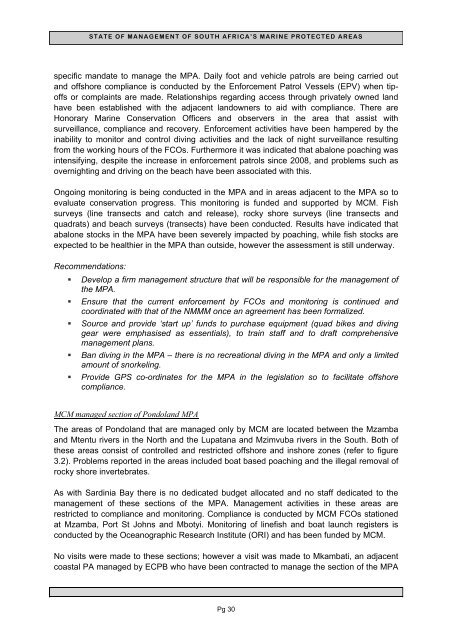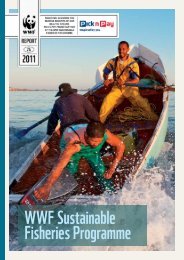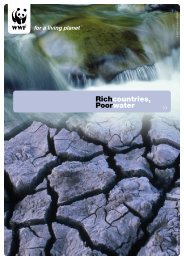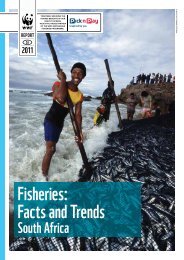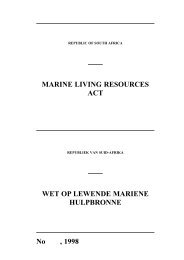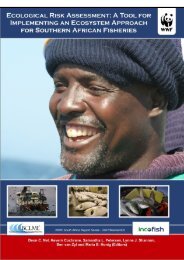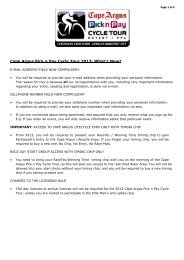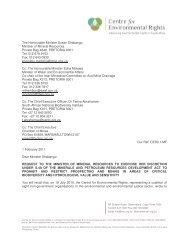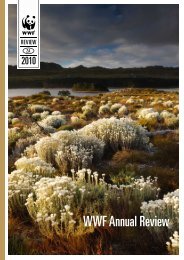State of Management of South Africaââ¬â¢s ... - WWF South Africa
State of Management of South Africaââ¬â¢s ... - WWF South Africa
State of Management of South Africaââ¬â¢s ... - WWF South Africa
- No tags were found...
Create successful ePaper yourself
Turn your PDF publications into a flip-book with our unique Google optimized e-Paper software.
STATE OF MANAGEMENT OF SOUTH AFRICA’S MARINE PROTECTED AREASspecific mandate to manage the MPA. Daily foot and vehicle patrols are being carried outand <strong>of</strong>fshore compliance is conducted by the Enforcement Patrol Vessels (EPV) when tip<strong>of</strong>fsor complaints are made. Relationships regarding access through privately owned landhave been established with the adjacent landowners to aid with compliance. There areHonorary Marine Conservation Officers and observers in the area that assist withsurveillance, compliance and recovery. Enforcement activities have been hampered by theinability to monitor and control diving activities and the lack <strong>of</strong> night surveillance resultingfrom the working hours <strong>of</strong> the FCOs. Furthermore it was indicated that abalone poaching wasintensifying, despite the increase in enforcement patrols since 2008, and problems such asovernighting and driving on the beach have been associated with this.Ongoing monitoring is being conducted in the MPA and in areas adjacent to the MPA so toevaluate conservation progress. This monitoring is funded and supported by MCM. Fishsurveys (line transects and catch and release), rocky shore surveys (line transects andquadrats) and beach surveys (transects) have been conducted. Results have indicated thatabalone stocks in the MPA have been severely impacted by poaching, while fish stocks areexpected to be healthier in the MPA than outside, however the assessment is still underway.Recommendations: Develop a firm management structure that will be responsible for the management <strong>of</strong>the MPA. Ensure that the current enforcement by FCOs and monitoring is continued andcoordinated with that <strong>of</strong> the NMMM once an agreement has been formalized. Source and provide ‘start up’ funds to purchase equipment (quad bikes and divinggear were emphasised as essentials), to train staff and to draft comprehensivemanagement plans. Ban diving in the MPA – there is no recreational diving in the MPA and only a limitedamount <strong>of</strong> snorkeling. Provide GPS co-ordinates for the MPA in the legislation so to facilitate <strong>of</strong>fshorecompliance.MCM managed section <strong>of</strong> Pondoland MPAThe areas <strong>of</strong> Pondoland that are managed only by MCM are located between the Mzambaand Mtentu rivers in the North and the Lupatana and Mzimvuba rivers in the <strong>South</strong>. Both <strong>of</strong>these areas consist <strong>of</strong> controlled and restricted <strong>of</strong>fshore and inshore zones (refer to figure3.2). Problems reported in the areas included boat based poaching and the illegal removal <strong>of</strong>rocky shore invertebrates.As with Sardinia Bay there is no dedicated budget allocated and no staff dedicated to themanagement <strong>of</strong> these sections <strong>of</strong> the MPA. <strong>Management</strong> activities in these areas arerestricted to compliance and monitoring. Compliance is conducted by MCM FCOs stationedat Mzamba, Port St Johns and Mbotyi. Monitoring <strong>of</strong> linefish and boat launch registers isconducted by the Oceanographic Research Institute (ORI) and has been funded by MCM.No visits were made to these sections; however a visit was made to Mkambati, an adjacentcoastal PA managed by ECPB who have been contracted to manage the section <strong>of</strong> the MPAPg 30


